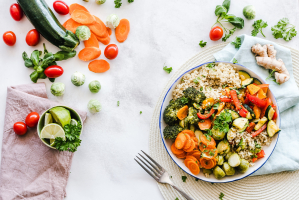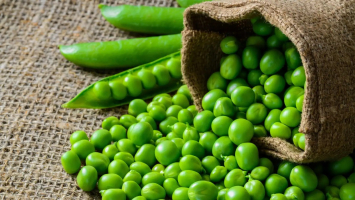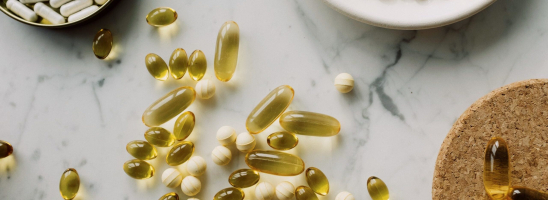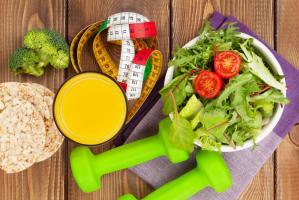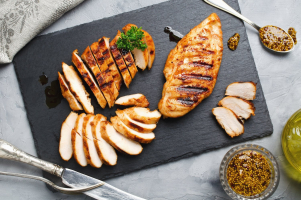Top 8 High Protein Nuts and Seeds for Building Muscles
Nuts are a tasty, protein-packed snack or supplement to meals. They're adaptable, convenient to eat on the go, and a wonderful source of plant-based protein, ... read more...especially for people who don't consume animal products. While all nuts contain protein, some have a higher protein content than others. This article discusses protein-rich nuts.
-
Almonds are a type of seed. However, they are frequently grouped with nuts and seen as a high protein option.
Aside from being high in protein, almonds are also high in antioxidants. These plant components protect the body from free-radical-induced oxidative stress, which can cause aging, heart disease, and some malignancies. Almonds can also help you lose weight by curbing your appetite.
The brown layer of skin surrounding almonds has the largest concentration of antioxidants, therefore eating almonds with the skin provides the most advantages.
Pair almonds with a piece of fruit to make a balanced snack.
HIGHLIGHT:
- Almonds contain 7 g of protein per 1/4 cup (35 g) consumption. They're also high in antioxidants, which can help protect your cells from damage.
Link: https://iherb.com/c/almonds
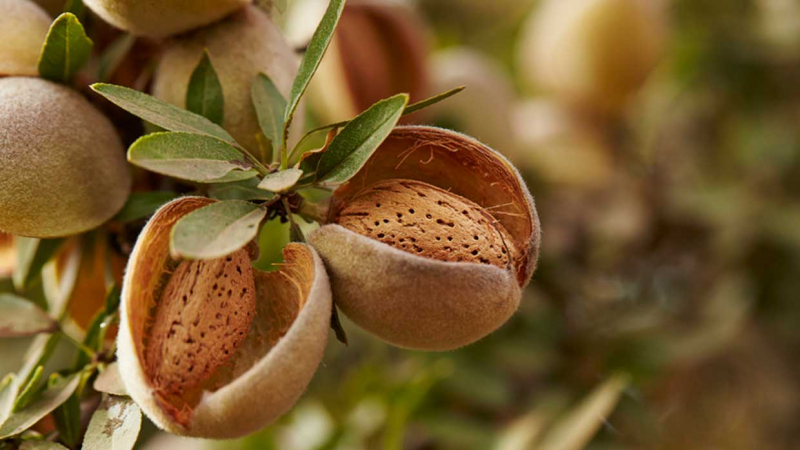
Almonds (photo:https://www.almonds.com/) 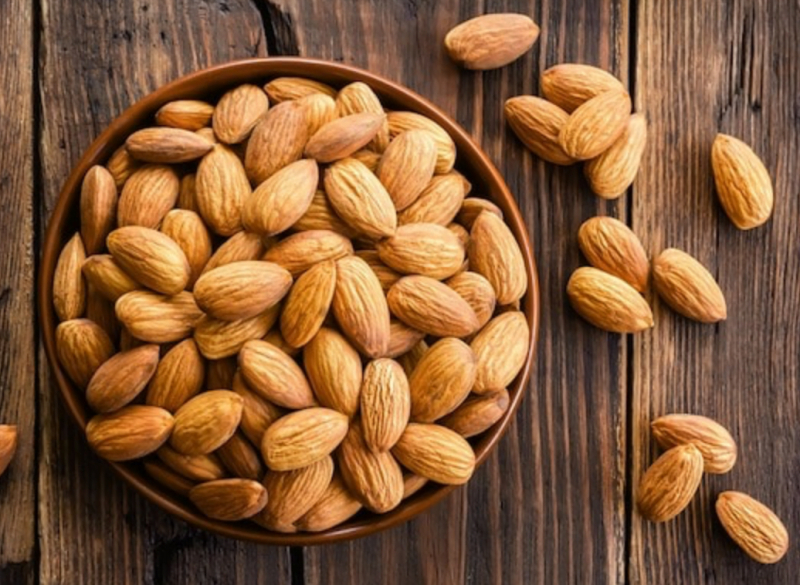
Almonds (photo: https://santorino.org/) -
Walnuts are highly nutritious nuts. Eating walnuts is a delightful way to increase your protein consumption.
Walnuts also have much more beneficial omega-3 fats and stronger antioxidant activity than any other common nut. This nutrient-dense profile adds to the various health benefits linked with walnuts, such as reduced inflammation and improved risk factors for heart disease.
Walnuts, with their fatty texture and mouthfeel, are a nice complement to ground meats and can help to improve the protein level of meat-based recipes.
HIGHLIGHT:
- Walnuts have 4.5 grams of protein per 1/4 cup (29 grams). Including walnuts in your diet is an excellent way to increase your intake of protein and heart-healthy omega-3 fatty acids.
Link: https://iherb.com/c/walnuts
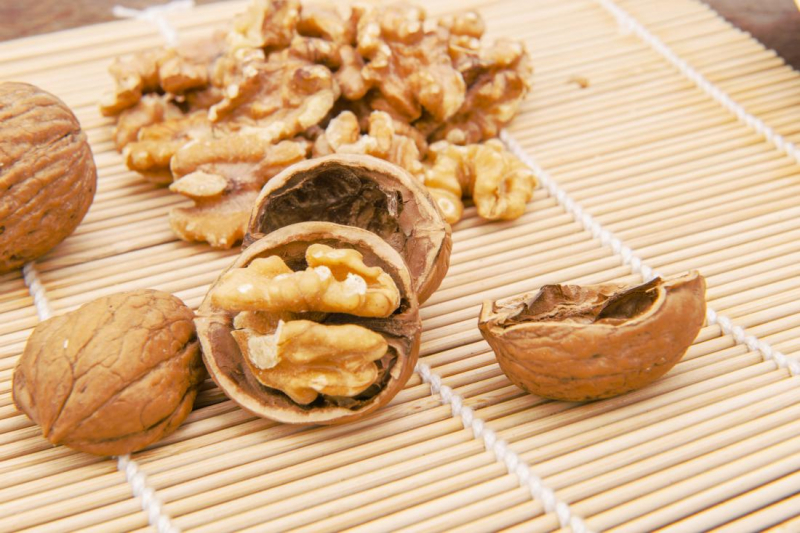
Walnuts (photo: https://www.medicalnewstoday.com/) 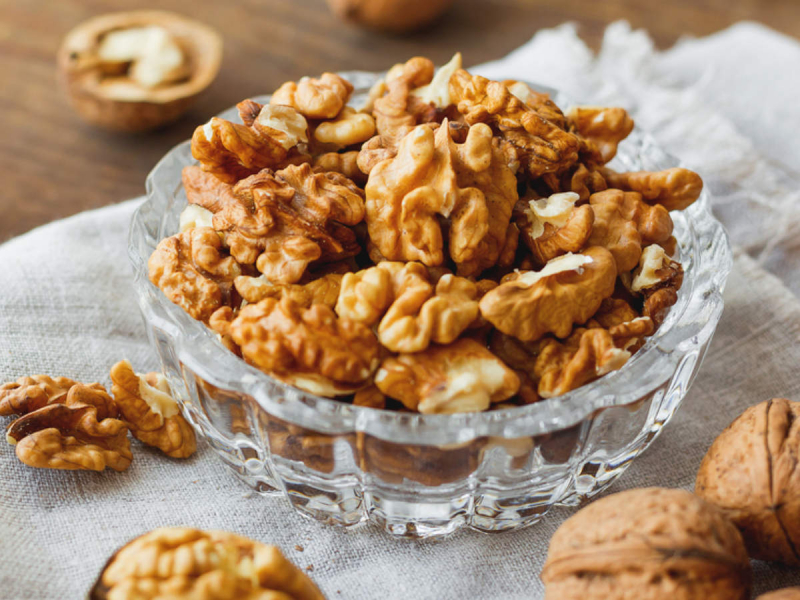
Walnuts (photo: https://timesofindia.indiatimes.com/) -
Pistachios are the seeds of the Pistachio vera tree, which produces clusters of small fruits that harden and break over time, exposing the seed within. Despite the fact that they are seeds, they are treated as nuts in the culinary world and are categorized as a tree nut allergen.
A serving of pistachios contains the same amount of protein as one egg.
When compared to most other nuts, these nuts have a higher ratio of essential amino acids to protein concentration. Essential amino acids are those that must be received through diet for the body to use to produce proteins that are required for vital tasks.
Blending pistachios into nut butter to munch over toast, apples, or crackers is a pleasant way to enjoy them.
HIGHLIGHT:
- Pistachios have as much protein as an egg per serving, with 6 grams of protein every 1/4 cup (30 grams), as well as a significant level of important amino acids.
Link: https://iherb.com/c/pistachios
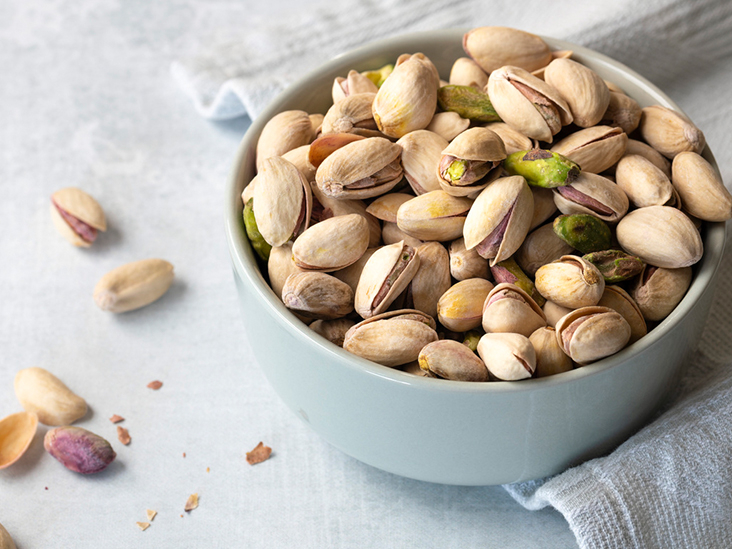
Pistachios (photo: https://www.healthline.com/) 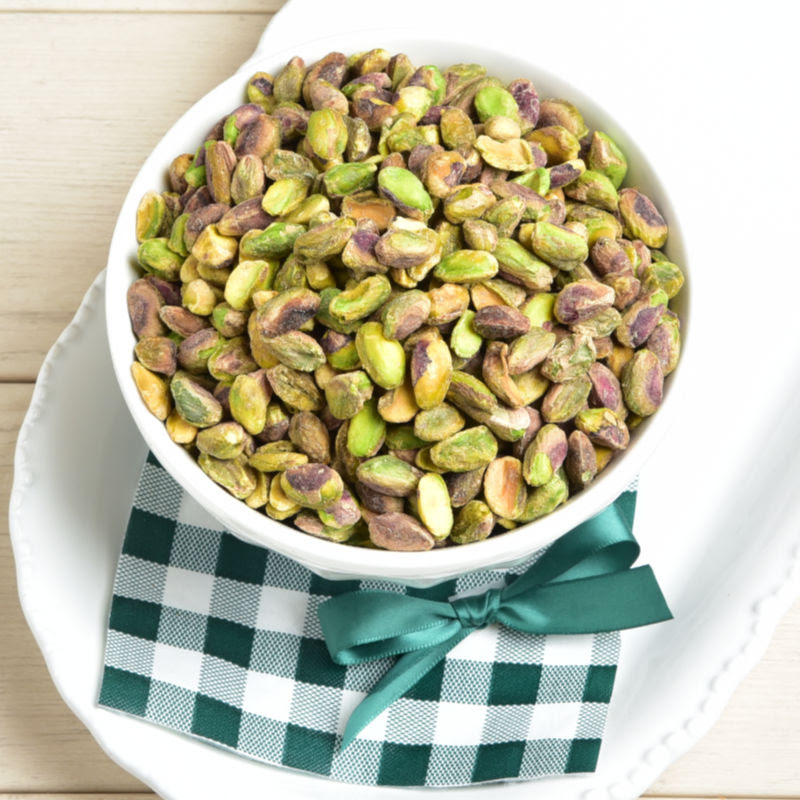
Pistachios (photo: https://www.sunnylandfarms.com/) -
Cashews are seeds, not nuts. They are abundant in protein and also include a variety of vitamins and minerals.
A 1/4-cup (32-gram) serving contains approximately 80% of the Daily Value (DV) for copper. Copper is a mineral that aids in the formation of red blood cells and connective tissue.
Low copper intake has also been linked to an increased risk of osteoporosis, a disorder characterized by weak and brittle bones, according to research.
Thus, increasing your copper intake through cashew consumption may be one strategy to help defend against this illness.
Eat cashews as part of a balanced snack on top of plain yogurt with fruit to get more cashews in your diet.
HIGHLIGHT:
- Cashews have 5 g of protein per 1/4 cup (32 g) serving. Cashews, in addition to protein, contain important minerals such as copper.
Link: https://iherb.com/c/cashews
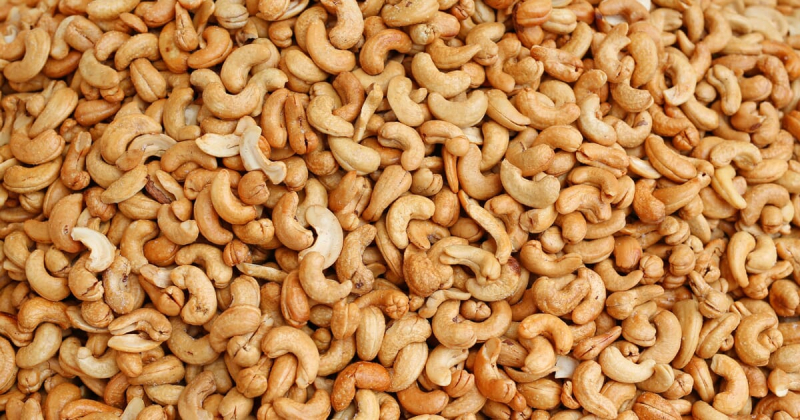
Cashews (photo: https://thefishsite.com/) 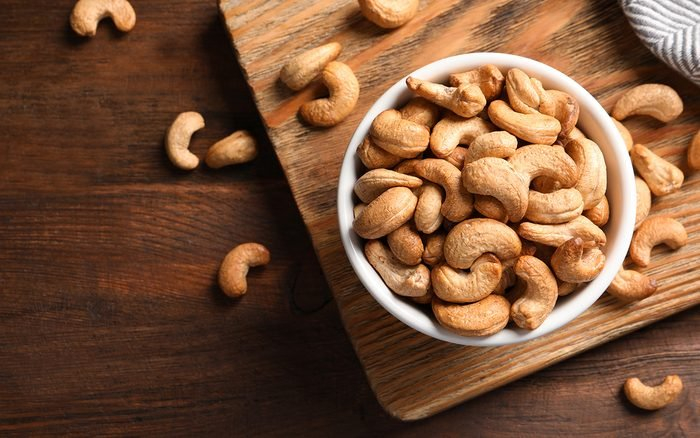
Cashews (photo: https://www.tasteofhome.com/) -
Pine nuts are the seeds found in certain types of pine cones. They are renowned for their mild, sweet flavor and buttery texture, which is due to their high-fat content.
A 1/4-cup (34-gram) portion of pine nuts has 23 grams of fat in addition to 4 grams of protein.
Pine nuts are high in unsaturated fats, which may help reduce risk factors for heart disease. One of the fatty acids found in pine nuts may have anti-inflammatory properties and aid in the prevention of cancer spread.
Toasted pine nuts are an excellent way to add protein to salads, grain bowls, or vegetables. To toast pine nuts at home, roast them for a few minutes in a skillet over medium heat until aromatic.
HIGHLIGHT:
- Sweet, buttery pine nuts are more than simply a tasty snack. They also provide 4.5 grams of protein and healthy fats per 1/4-cup (34-gram) serving.
Link: https://iherb.com/pr/now-foods-real-food-organic-raw-pine-nuts-8-oz-227-g/46308
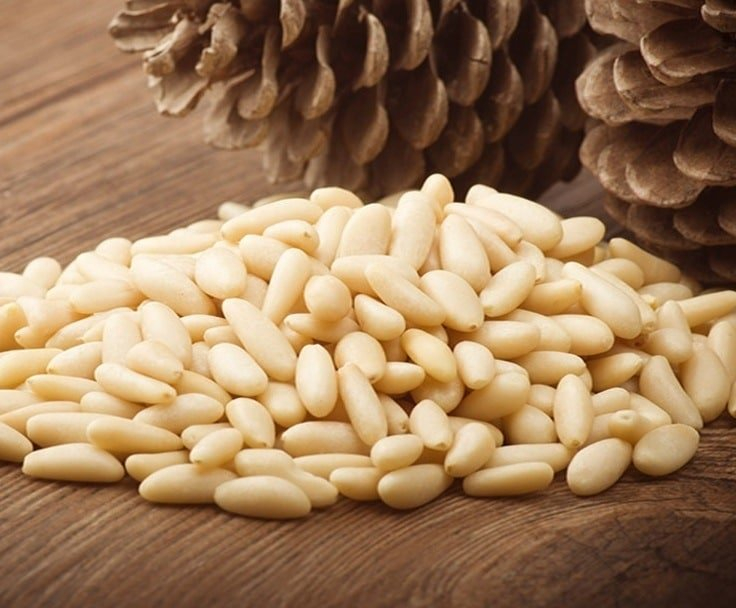
Pine nuts (photo:https://www.grandturkishbazaar.com/) 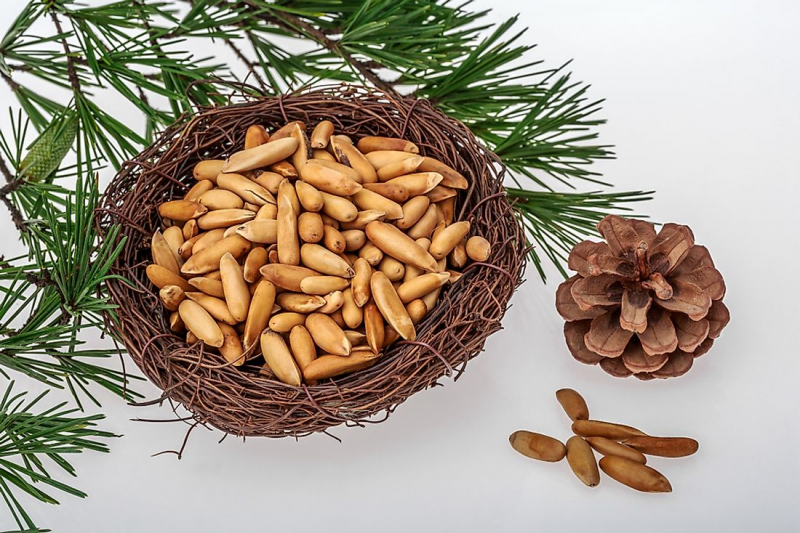
Pine nuts (photo: https://www.worldatlas.com/) -
Brazil nuts are made from the seeds of a rainforest tree and are easy to identify in a bag of mixed nuts since they are usually the largest.
They include protein as well as healthy fats, fiber, and a variety of minerals. Furthermore, Brazil nuts are an excellent source of selenium, a vital mineral that promotes thyroid health and protects the body from infection.
One Brazil nut (5 grams) has over 175 percent of the DV for selenium. For a protein-rich trail mix, combine Brazil nuts with other nuts and seeds, dried mango, and dark chocolate pieces.
HIGHLIGHT:
- Brazil nuts offer 4.75 grams of protein per 1/4-cup (33-gram) serving. Eating Brazil nuts is a wonderful method to increase your protein intake while also meeting your daily selenium requirements.
Link: https://iherb.com/c/brazil-nuts
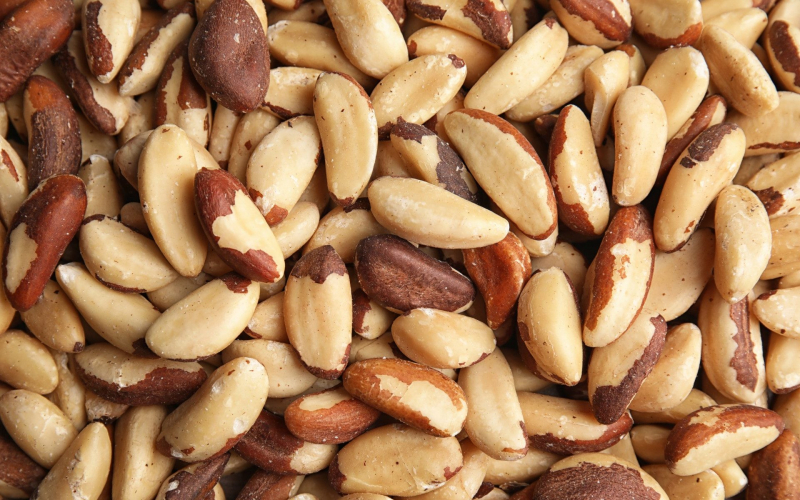
Brazil nuts (photo: https://brazilbustravel.com/) 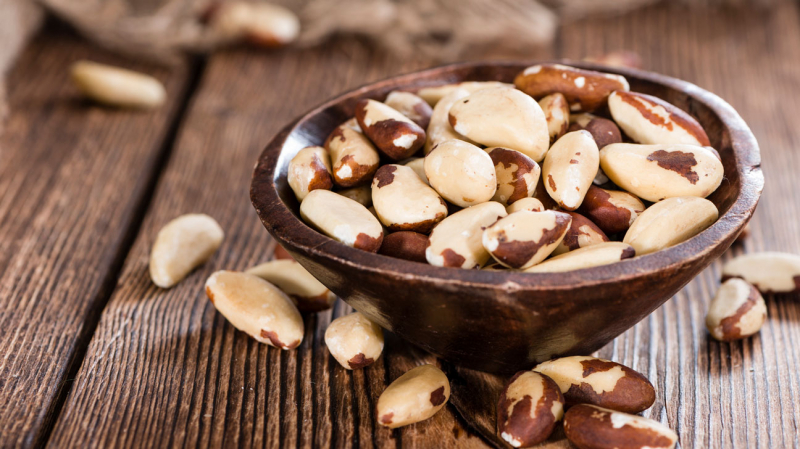
Brazil nuts (photo: https://www.healthline.com/) -
Peanuts are a popular snack that is also nutritious. In fact, peanuts are a legume, yet they are regarded as nut nutritionally and culinary.
They are high in plant-based protein, as are most legumes. Peanuts have the highest protein level of any frequently ingested nut.
Peanuts are also high in biotin, a vitamin that aids in the conversion of food into useful energy in the body.
Combine peanut butter and bananas on their own for a balanced snack that contains protein, lipids, and carbohydrates, or layer them on top of the bread.
HIGHLIGHT:
- Peanuts have the highest protein content of any nut on the list, with 9.5 grams per 1/4 cup (37 grams). They also give a good source of biotin and other nutrients.
Link: https://www.amazon.com/Peanuts/b?ie=UTF8&node=16322941
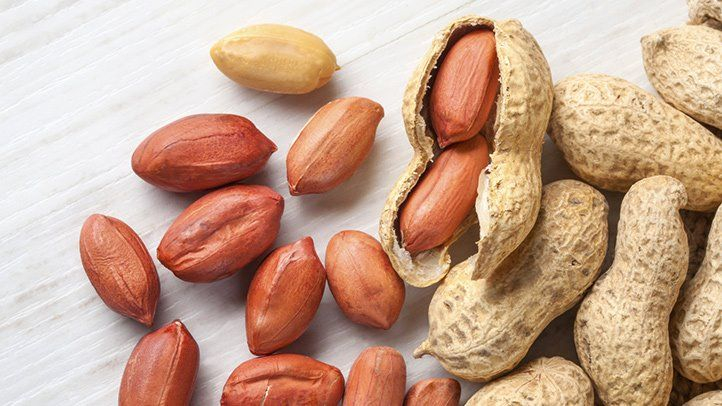
Peanuts (photo: https://www.everydayhealth.com/) 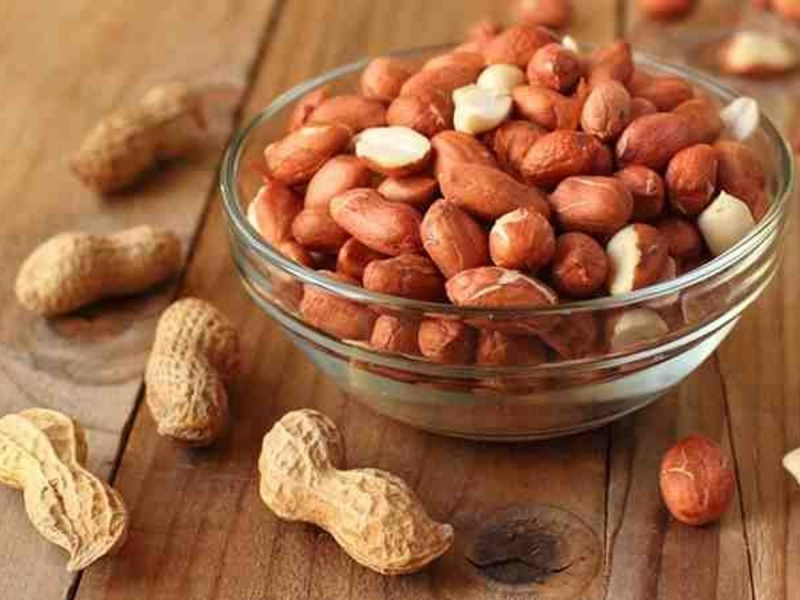
Peanuts (photo: https://www.groids.com/) -
Hazelnuts have a somewhat sweet, buttery, and toasted flavor, making them a very tasty protein source.
Hazelnuts are high in nutrients such as vitamins, minerals, antioxidants, and healthy fats. They may also provide health benefits, such as lowering blood fat levels, controlling blood pressure, reducing inflammation, and improving blood sugar levels.
Adding hazelnuts to your diet may also help lower LDL (bad) cholesterol while increasing HDL (good) cholesterol, lessening your risk of heart disease.
Make your own homemade "Nutella" spread for a high-protein snack. 1 cup (135 g) hazelnuts, 2 scoops (60 g) chocolate protein powder, 1 tablespoon (6 g) cocoa powder, 2 tablespoons (30 mL) maple syrup
HIGHLIGHT:
- Hazelnuts contain 5 grams of protein per 1/4-cup (34-gram) serving. Consuming more hazelnuts may assist improve heart health and lessen the risk of heart disease in addition to increasing protein intake.
Link: https://iherb.com/pr/wilderness-poets-oregon-hazelnuts-8-oz-226-8-g/69018
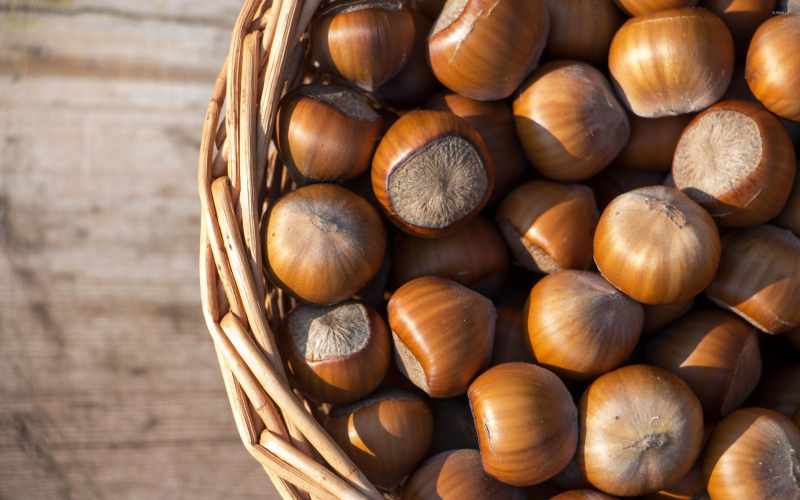
Hazelnuts (photo: https://suwalls.com/) 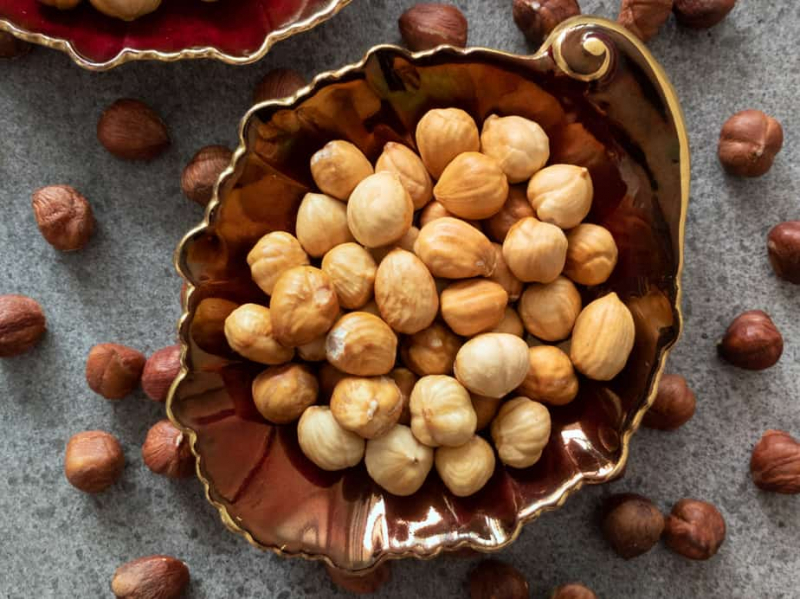
Hazelnuts (photo: https://importing-house.com/)










